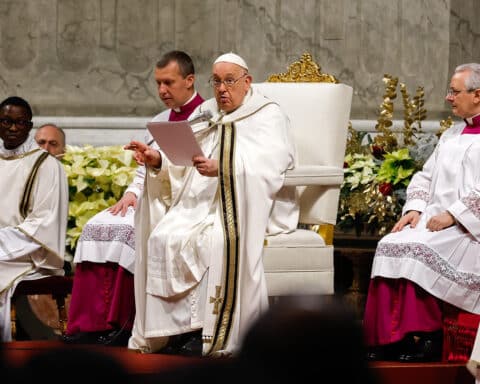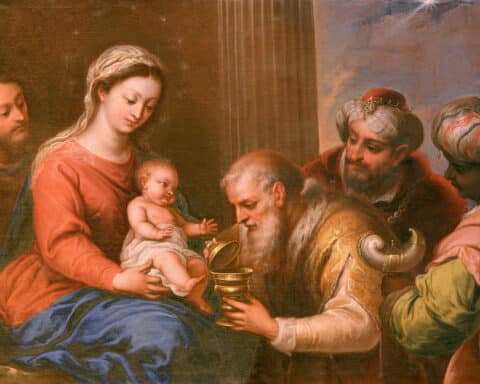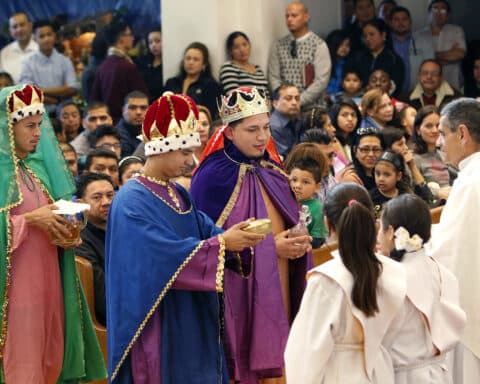
— Jon Rater, via email
Answer: The Magi were not likely kings. This notion arises from a conflation of Old Testament texts such as from the psalms: “May the kings of Tarshish and the islands bring tribute, the kings of Sheba and Seba offer gifts. May all kings bow before him, all nations serve him” (Ps 72:10-11).
Rather, the Magi were likely among an elite class of Persians or other nearby nations who were skilled in many studies, including the stars. In modern language, we could call them astronomers. However, astronomers do not usually place meaning in the alignment of certain stars or planets as do astrologers. While horoscopes and other such attempts to predict the future are wrong for Catholics, we ought not consider these Magi in that superstitious category. While they were interpreting meaning from the alignment of the stars or planets, they were actually correct in their interpretation, and God chose to call them by this. Scripture itself had prophesied: “A star shall advance from Jacob, and a scepter shall rise from Israel” (Nm 24:17). So, in rare cases, the alignment of the stars means something. Still we ought, generally, to abstain from strange and superstitious attention to such matters.
The key point in the story of the Magi is the call of the Gentiles. They did not have Scripture, but they had the “book of creation,” and God called them through the natural order. In a sense, our Nativity sets are complete on Epiphany as an image for the Church and the Body of Christ. For there we see the poor and rich, the simple and the learned, the saints and the sinners, and, above all, Jews and Gentiles. St. Paul writes: “the mystery was made known to me by revelation, as I have written briefly earlier. When you read this you can understand my insight into the mystery of Christ, which was not made known to human beings in other generations as it has now been revealed to his holy apostles and prophets by the Spirit, that the Gentiles are coheirs, members of the same body, and copartners in the promise in Christ Jesus through the gospel” (Eph 3:3-6). So the arrival of the Magi is not some quaint story; it is a revelation of the true and catholic nature of the Church. Today, while many talk of diversity and inclusivity, the Catholic Church lives this reality. We are in every nation; we speak every language; and to go to a typical American parish is to behold the United Nations. There is an expression among evangelists in the Catholic Church: “Here comes everybody!” And that is a truth about the Catholic Church, which the Nativity scene including the Magi depicts. The final command of Jesus was: “Go, therefore, and make disciples of all nations, baptizing them in the name of the Father, and of the Son, and of the holy Spirit, teaching them to observe all that I have commanded you” (Mt 28:19-20).
Morality of money
Question: I have a friend who asked me to lend him some money. Originally, his daughter was to lend it to him, but she told him she now is using the money for an abortion. So now he’s coming to me for it. Would it be wrong in this situation to loan him the money?
— Deborah Mrock, via email
Answer: Not technically or directly. You are not funding or cooperating in the act of abortion. Hence we are dealing with a prudential judgment. However, it is unclear from your question as to what his attitude is regarding the abortion or how his daughter would react if you refuse the loan. If you loaning the money just gives them an easy way out, the loan should be refused. If, however, that money has gone away and, sadly, the abortion is already paid for, you can give him the loan while announcing your moral opposition to abortion. The key point is that in no way should you cooperate in the act of abortion such that your giving the loan helps them procure the abortion.
Msgr. Charles Pope is the pastor of Holy Comforter-St. Cyprian in Washington, D.C., and writes for the Archdiocese of Washington, D.C. at blog.adw.org. Send questions to msgrpope@osv.com.





